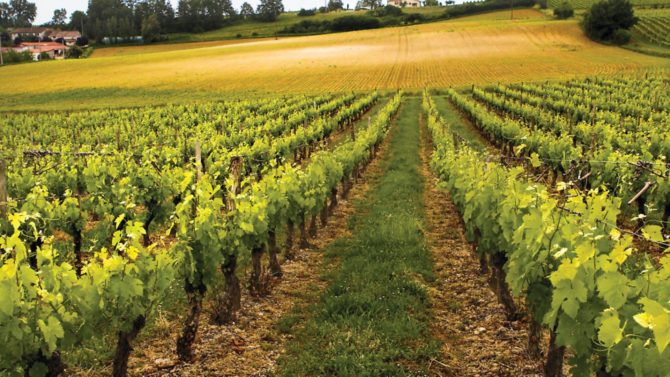All you need to know about buying a vineyard in France

You might think that having your own vineyard and producing your own wine is only for the rich, but owning a vineyard in France could be easier than you expect
Written by Vicky Goodall, Home Hunts
Surely there can be nothing more rewarding than opening and enjoying a bottle of a wine that has been produced from your own vines? If you have a dream of becoming a vigneron but are worried about your lack of expertise, you will be pleased to know that becoming a vineyard owner is not as difficult as you might think, and there is plenty of help at hand to guide you through the process.
“We’ve helped lots of clients with no previous experience,” says Tim Swannie, director of vineyard property agent Home Hunts. “Looking after a hobby vineyard in France doesn’t have to dominate your time – you could get a local vineyard to manage and harvest the grapes. Of course, if you’re keen to learn the ropes yourself that’s also no problem – although that route is obviously more time-consuming.”
Even taking on a commercial venture wouldn’t be impossible, but, like any property purchase, preparation is key. A property with a vineyard attached takes extra thinking and research and one of the key things to do, before you even start looking at properties, is to consider the legal and tax implications. Getting good advice on how to structure the purchase is essential and could save you thousands of euros in the long run.
__________________________________________________________
Don’t miss
An insider’s guide to France’s wine regions
Guide to white wines from France
__________________________________________________________
How much does it cost to buy and run a vineyard?
The price for land varies enormously, of course, depending on how prestigious it is. ‘Appellation’ land, technically speaking AOP land, refers to the French classification for recognised wine regions. To give you an idea of the variation in land value, prices are currently €20,000/ hectare in Bergerac, €500,000/ hectare in St-Émilion (Dordogne floodplain) and €5m/hectare in St-Émilion (Pomerol borders and plateau).
In terms of running costs, Swannie explains that “if you want to keep all the wine yourself, then of course there would be a cost. Often though, it doesn’t have to cost anything at all. Many owners have their vines looked after for free. The local vineyard keeps the majority of the wine and pays the owner with a certain number of bottles each year.”
What should I be looking for when buying a vineyard?
Buying a vineyard with quality terroir rather than thinking about a particular location, can produce a highly competitive wine product, so making it a priority can prove to be a very savvy investment strategy for those buying a wine business. The concept of terroir encompasses location, soil, climate and grape variety, as well as the local culture and production methods. All these elements have an influence over the considered value of the terroir.
“When you consider that Château Reignac, in Entre-Deux-Mers, sells for €16 per bottle and it came out on top in a blind tasting against wines being sold for up to €700 per bottle, one begins to understand that terroir trumps some very big names indeed,” explains vineyard property expert Rory Ramsden.
Areas that could offer potentially lucrative investment opportunities include the Côtes de Castillon appellation near St-Émilion, and Montcaret and Montravel, both around an hour east of Bordeaux. There are also plenty of areas throughout France’s many wine regions that offer interesting investment opportunities.
__________________________________________________________
Don’t miss
The legal process of buying a French process
Our favourite 10 wine producing towns in France
__________________________________________________________
How do I find a vineyard for sale?
It is commonplace for agents to have only approximately 10% of the vineyard properties that are for sale on their books. Vineyard owners are particularly discreet as they don’t want their competitors or staff to know their property is on the open market – as a result, buyers need to put their detective hats on and be prepared to dig a little deeper.
“Finding and buying a vineyard takes time and fewer than 50 of the 7,000 vineyards in Bordeaux are sold each year,” says Ramsden. “You have to be well connected in the industry to know the true status of the properties up for sale. Working with a vineyard specialist who can give advice and in-depth knowledge on this is a must for a serious vineyard investor.”
What type of vineyard will make a profit?
Ramsden recommends buyers ask themselves two questions before making any decisions about their involvement in a wine business. “Potential vineyard investors need to ask what the profile of their ideal client is, and if the vineyard they are looking to purchase produces the wine that these people want to buy,” he advises. “Buying a commercial vineyard is a business decision and should always be based on metrics and a good business plan.”
Consumers around the world are becoming more demanding and looking for more organic or biodynamic wines for their eco-friendly flavours. As a result, vineyard sales searches are reflecting this movement, despite the more intensive work involved.
Increasingly, vineyard owners balance this with a high-tech approach in the vinification process, using drones over the vineyards to assess the grapes and super-high-tech processes in the lab to analyse the state of the wine.
Another area of potential income from your vineyard is oeno-tourism (wine-tasting and tours) which, if done well, allows the vineyard property owner to maximise revenues from his investment. A good example is Château Reignac in St-Loubès near Bordeaux, while Château Feely in the Saussignac appellation is another.
So, what are you waiting for? There’s a bottle of wine waiting with your name on it!
Like this? You might enjoy:
Guide to red wines from France
Share to: Facebook Twitter LinkedIn Email


